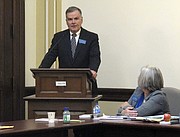GOP expands scope of special session
HELENA — Republican lawmakers on Friday said they have the support to expand the scope of Montana’s special session next week to vote on cuts proposed by Democratic Gov. Steve Bullock and consider additional transfers of money as the state faces a projected $227 million budget deficit.
Republicans want to consider tapping about $30 million the state has set aside for the possible purchase of the private prison in Shelby. The money is controlled by CoreCivic under its contract to run the prison. Lawmakers say CoreCivic wants its management contract extended for 10 years in exchange for allowing the state to access the money.
“With taxpayers in mind, we’re bringing more options to the table so that we can make better decisions,” Senate President Scott Sales said in a statement Friday. “We’re bringing the offer from the prison in Shelby, additional ideas for transferring funds, and we’re going to make sure that Gov. Bullock’s cuts are talked about and voted on.”
“Before raising taxes or cutting benefits, we’re going to look at all functions of government,” said Sales, a Republican from Bozeman.
However, Republicans have at least one tax increase on the table — a 2.75 percent premium tax for PacificSource and the Montana Health Insurance Co-op, both of which are nonprofit health insurance providers. Blue Cross and Blue Shield of Montana, a for-profit company, pays the premium tax, and lawmakers argue that gives PacificSource and the co-op a financial advantage.
After two years, in the interest of tax fairness, Sales said the tax percentage could be reduced for all three. The Bullock administration notes that Blue Cross didn’t pay a premium tax when it was a not-for-profit, and it would see a large tax cut if the premium tax rate was later reduced.
The GOP also wants to reduce the percentage of the entire budget that the state is required to hold in reserve from 5 percent to 2 percent
While that would make it much easier to reach a balanced budget, as required by the state constitution, the administration argues it could hurt the state’s bond rating and leave its finances on more precarious footing.
“We will be opposing that legislation pretty vigorously,” said Budget Director Dan Villa, who noted at least one bond rating agency has said it will review the state’s credit rating after the special session.
Sales said he did not believe the reduction would harm the state’s credit rating.
Bullock called the special session Monday to address the budget deficit, which was caused by lower-than-expected tax revenues, unexpected fire costs and the Republican majority adopting what the administration felt was an unrealistic revenue forecast. The governor argues a third of the deficit should be addressed through cuts, a third through fund transfers and a third through tax increases and other fees.
Republicans, who hold a 91-59 majority in the legislature, polled lawmakers and had received more than 76 signatures by Friday to expand the session.
House Speaker Austin Knudsen, a Republican from Culbertson, had earlier rejected the idea of a special session, arguing the governor had the authority to cut up to 10 percent of general fund spending to balance the budget. Interim committees considering the $227 million proposal urged the governor to avoid cuts that would harm the state’s most vulnerable residents. However, with the majority of the state’s general fund budget going to the Department of Public Health and Human Services, that agency also faced the largest cuts.
Bullock is “committed to balancing the budget in a responsible way and he will continue to work with Republican and Democratic legislators to find a path forward,” Ronja Abel, the governor’s spokeswoman, said Friday.
State agencies have already absorbed $97 million in cuts under a bill authorized by the 2017 Legislature in case state revenues came in lower than the forecast Republicans had accepted. Agencies started the legislative session with across-the-board budget cuts compared with their 2015-2017 budgets.
Committee meetings are scheduled to start Monday and run into Tuesday morning, with lawmakers gaveling into session Tuesday afternoon.



